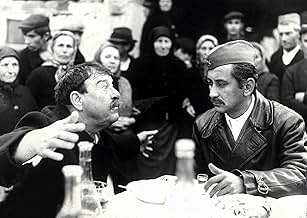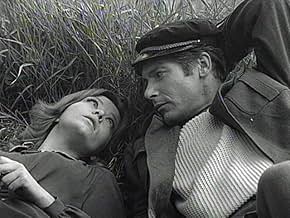Idealistic young man supports the party and the new Yugoslavia's communist regime, but soon gets involved in various political and criminal machinations becoming more and more confused about... Read allIdealistic young man supports the party and the new Yugoslavia's communist regime, but soon gets involved in various political and criminal machinations becoming more and more confused about what's right and what's wrong.Idealistic young man supports the party and the new Yugoslavia's communist regime, but soon gets involved in various political and criminal machinations becoming more and more confused about what's right and what's wrong.
- Awards
- 2 wins total
Milena Dravic
- Milica
- (as Milena Dravić)
Ivica Vidovic
- Ive 'Vrana'
- (as Ivica Vidović)
Severin Bijelic
- Zeka
- (as Severin Bijelić)
Slobodan Aligrudic
- Jotic
- (as Slobodan Aligrudić)
Pavle Vuisic
- Staresina sela
- (as Pavle Vujisić)
Marija Milutinovic
- Slavka
- (as Marija Milutinović)
Mirjana Blaskovic
- Milanka
- (as Mirjana Blašković)
Mirjana Nikolic
- Uciteljica
- (as Mirjana Nikolić)
Alenka Rancic
- Drugarica s naocarima
- (as Alenka Rančić)
Milivoje 'Mica' Tomic
- Profesor razrednik
- (as Milvoje Tomić)
Branko Obradovic
- Pukovnik Ozren
- (as Branko Obradović)
Rastislav Jovic
- Odbornik u belom mantilu
- (as Rastislav Jović)
Milorad Majic
- Starac Bozo
- (as Milorad Majić)
Dusan Tadic
- Tip s povezom preko oka
- (as Dušan Tadić)
Ljubomir Cipranic
- Pop
- (as Ljubomir Čipranić)
Branko Milicevic
- Vodja skojevaca
- (as Branislav Miličević)
Branislav 'Ciga' Milenkovic
- Covek koji prica o Joticu
- (as Branislav Milenković)
Featured reviews
From the first crackle of Milorad Jaksic-Fandjo's charcoal-black photography, Pavlovic's fifth feature announces itself as a cold shower poured over the glowing embers of Partisan mythology. Set in the winter of 1945, the film trails Ive Vrana (Ivica Vidovic), a fresh-faced Dalmatian idealist who arrives in a Serbian village armed with little more than a party badge and a head full of brotherhood-and-unity slogans, some often played on his accordion. Within days he is ordered to betray his bourgeois sweetheart Milica (Milena Dravic), bullied by the vodka-soaked commissar Zeka (Severin Bijelic), and finally shot by his own comrades when papers cannot vouch for his loyalty. Pavlovic adapting his own story with Antonije Isakovic, strips the frame of heroic backlighting; instead we get mud, slush and the sour smell of improvised justice. The result is the first Yugoslav film to suggest that the revolution devoured not only its children, but its very conscience.
Vidovic's translucent eyes register every incremental bruise to his faith, moving from eager nods to the hollow stare of a man who realises he is disposable. Opposite him, Dravic turns Milica into a quiet storm of intelligence and repressed panic, her final glance at Ive a silent indictment of every slogan shouted over her head. Bijelic, meanwhile, crafts Zeka as a Balkan hybrid of Falstaff and Stalin's commissars-equal parts charisma and menace-whose slurred orders carry the weight of the new orthodoxy. Shot almost documentary-style on frozen Sumadija locations, the film was shelved domestically after a hostile Pula première, yet travelled to Venice where it snatched the Golden Lion and the CIDALC award. Critics dubbed it "the anti-Partisan western," praising Pavlovic for trading epic heroics for the existential dread of a man who discovers that the revolution has no memory, only an appetite.
Today, restored in 2K by the Yugoslav Film Archive, Zaseda stands as the cornerstone of the Black Wave and a blueprint for every later ex-Yugoslav film that dared question official frescoes. In a 1983 poll of ninety domestic critics, Pavlovic placed three titles among the twenty best Yugoslav films ever made-an achievement he shares only with Aleksandar Petrovic. More importantly, the movie's DNA can be traced through the works of Zilnik, Kusturica and Tanovic: the muddy palette, the ironic use of folk songs, the tragicomic bureaucracy of death. Half a century on, Ive's last words-"Some revolution this is!"-still echo across the region like a curse uttered in a kafana at closing time. Zaseda is not merely a film; it is the moment Yugoslav cinema admitted that its founding myth wore a borrowed uniform-and that the uniform never quite fit.
Vidovic's translucent eyes register every incremental bruise to his faith, moving from eager nods to the hollow stare of a man who realises he is disposable. Opposite him, Dravic turns Milica into a quiet storm of intelligence and repressed panic, her final glance at Ive a silent indictment of every slogan shouted over her head. Bijelic, meanwhile, crafts Zeka as a Balkan hybrid of Falstaff and Stalin's commissars-equal parts charisma and menace-whose slurred orders carry the weight of the new orthodoxy. Shot almost documentary-style on frozen Sumadija locations, the film was shelved domestically after a hostile Pula première, yet travelled to Venice where it snatched the Golden Lion and the CIDALC award. Critics dubbed it "the anti-Partisan western," praising Pavlovic for trading epic heroics for the existential dread of a man who discovers that the revolution has no memory, only an appetite.
Today, restored in 2K by the Yugoslav Film Archive, Zaseda stands as the cornerstone of the Black Wave and a blueprint for every later ex-Yugoslav film that dared question official frescoes. In a 1983 poll of ninety domestic critics, Pavlovic placed three titles among the twenty best Yugoslav films ever made-an achievement he shares only with Aleksandar Petrovic. More importantly, the movie's DNA can be traced through the works of Zilnik, Kusturica and Tanovic: the muddy palette, the ironic use of folk songs, the tragicomic bureaucracy of death. Half a century on, Ive's last words-"Some revolution this is!"-still echo across the region like a curse uttered in a kafana at closing time. Zaseda is not merely a film; it is the moment Yugoslav cinema admitted that its founding myth wore a borrowed uniform-and that the uniform never quite fit.
It's hard to review this movie since it seems to require a knowledge of post-WW II Yugoslavia that I don't have. I certainly enjoyed it but was never able to escape the feeling that I was missing important points. The movie is set (I think--it's never made explicit) in the days right after WW II and is about a high school student who is a member of the communist party but is witness and participant of a number of incidents that make him question the motivation of his fellow party members. It is hard to believe that a movie that cynical about how the communists took over was able to be made in a communist country. (Although there are many close ups of pictures of Stalin so I got the impression that the director was laying a lot of the blame of the excesses of the period on him.) The story is told with a lot of humor and with short jerky scenes that often raise more questions than they answer. Bonus points for lots of great folk music, which would be reason enough to watch even if the rest of the movie wasn't so enjoyable.
Did you know
- TriviaAs of 2016 it was included in the #100 Serbian movies list (1911-1999) and protected as cultural heritage of great importance.
- ConnectionsFeatured in Zabranjeni bez zabrane (2007)
Details
- Runtime
- 1h 20m(80 min)
- Color
- Sound mix
Contribute to this page
Suggest an edit or add missing content





















